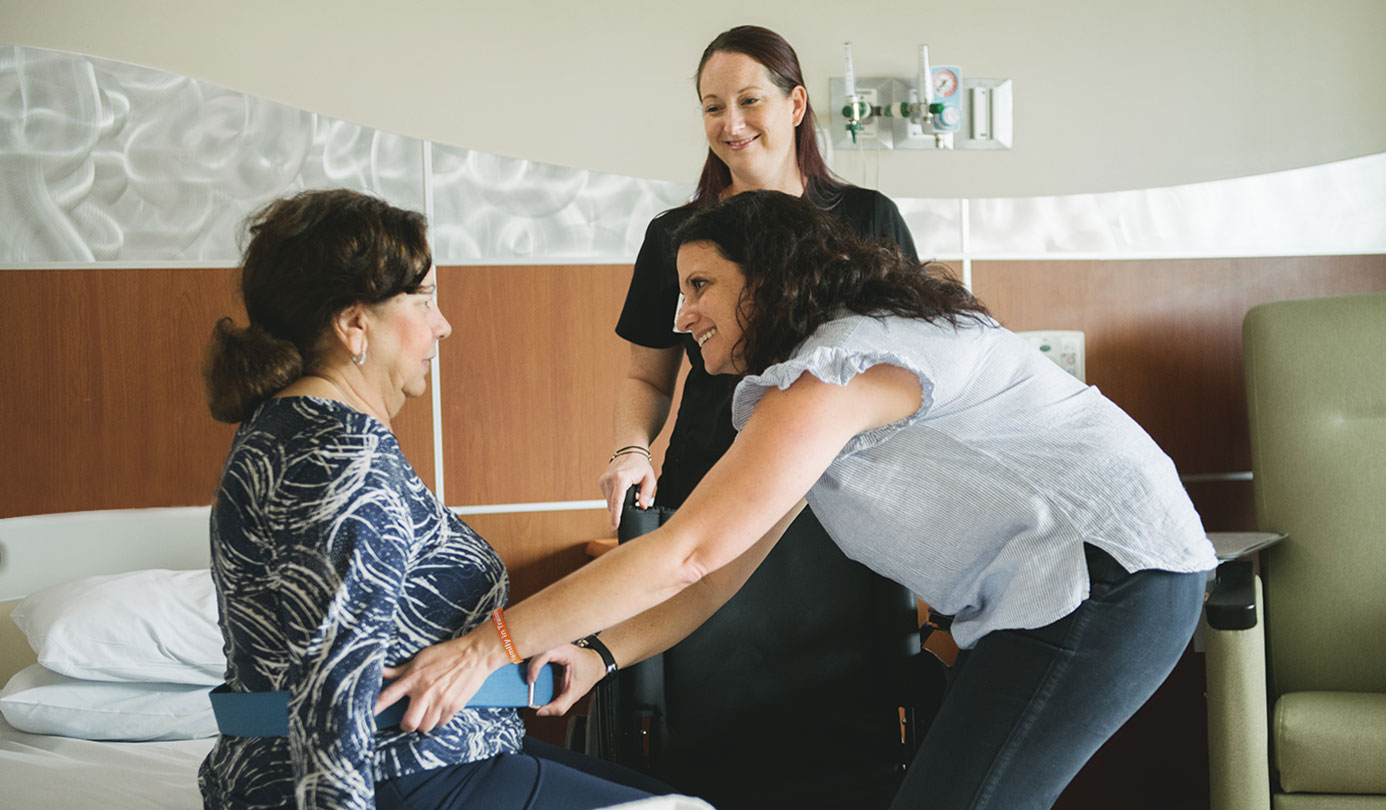
Stroke Care
Our certified Comprehensive Stroke Center at Memorial Regional Hospital has neurosurgical services available 24/7, and the ability to meet the needs of multiple complex stroke patients.
To schedule an appointment for an initial evaluation after a stroke, or for follow up care, please call
954-265-9500Know the Signs of Stroke — BE FAST
A stroke blocks or restricts the flow of blood and oxygen to brain cells. When a stroke strikes, every second lost means loss of brain function. Use the BE FAST model to recognize the signs of a stroke — you might notice one, some or all of these symptoms:
- Balance — Loss of coordination?
- Eyesight — Blurred or double vision?
- Face — Is the person’s smile uneven or lopsided?
- Arm — When raised does one arm drift downward?
- Speech — Is the person unable to speak or hard to understand?
- Time to CALL 911 — Immediately!

Remember BE FAST – With a Stroke Every Second Counts
To schedule an appointment for an initial evaluation after a stroke, or for follow up care, please call
954-265-9500The Joint Commission certified Comprehensive Stroke Center at Memorial Regional Hospital and the DNV Healthcare certified Comprehensive Stroke Center at Memorial Hospital West have the expertise to diagnose patients who require intensive medical and neurosurgical care 24/7, and deliver high-quality care to meet the needs of the most complex stroke patients offering evidence based treatments with cutting edge research protocols.
The Joint Commission certified Primary Stroke Center at Memorial Hospital Pembroke and Memorial Hospital Miramar provides the next-highest level of stroke care with an acute stroke team and access to a neurologist 24/7 and ability to provide IV thrombolytics.
Our Stroke Center Locations
- Memorial Regional Hospital (Advanced Comprehensive Stroke Center)
- Memorial Hospital West (Comprehensive Stroke Center)
- Memorial Hospital Pembroke (Primary Stroke Center)
- Memorial Hospital Miramar (Primary Stroke Center)
How We Treat Strokes
Memorial Neuroscience Institute is committed to providing high quality care to each and every stroke patient. During a stroke, time is brain. Every minute that lapses before treatment can mean the difference between losing and saving critical brain functions.
When our team is notified by Fire-Rescue that a stroke patient is en route to one of our hospitals, we mobilize and are ready to quickly evaluate and offer time-sensitive treatments in our emergency rooms and cath labs. We recognize the significance of acute stroke care in improving quality of life.
Our stroke teams can:
- Administer thrombolytics (clot-dissolving drugs)
- Perform neurointerventional and neurosurgery procedures
- Offer patients a wide range of rehabilitation services
Memorial's Comprehensive Stroke program treats among the highest volume of acute stroke patients in South Florida while exceeding the national benchmarks for safety and efficiency.
Memorial Stroke Clinic
Equally important is the preventative care stroke patients receive after they leave the hospital to reduce the chance of another stroke. Memorial Neuroscience Institute Stroke Clinic ensures patients who have suffered a stroke get the necessary follow up after being discharged from the hospital.
Memorial's Stroke Clinic is staffed by board-certified neurologists who provide expertise in the evaluation and management of stroke patients.
- Atrial fibrillation
- Blood clotting disorders
- Carotid artery stenosis
- Intracranial stenosis
- Moyamoya vasculopathy
- Patent foramen ovale
- Sickle cell disease
- Subclavian steal syndrome
- Vessel dissection
To schedule an appointment for an initial evaluation after a stroke, or for follow up care, please call
954-265-9500
We Lead with Stroke – Memorial Neuroscience Institute
Our Awards and Accolades for Stroke Treatment
We have received several awards for improving patient care and outcomes for our stroke patients, which includes making sure that stroke patients receive a clot-dissolving drug, called tPA, shortly after arriving at our emergency room. In a 12-month period, at least 75 percent of stroke patients at Memorial Regional Hospital and Memorial Hospital West emergency rooms received tPA within 60 minutes of arriving. In addition, at least 50 percent of stroke patients received tPA within 45 minutes of arriving.
Some of our awards include:
- Gold Plus with Target: Stroke Honor Roll Elite Plus, Target: Stroke Advanced Therapy Honor Roll and Target: Type 2 Diabetes Honor Roll recognition in the American Heart Association/American Stroke Association's Get With The Guidelines-Stroke® program (Memorial Regional Hospital and Memorial Hospital West)
- The Joint Commission and American Heart Association/American Stroke Association Comprehensive Stroke Center certification (Memorial Regional Hospital)
- DNV Comprehensive Stroke Center certification (Memorial Hospital West)
- Agency for Health Care Administration (AHCA) Comprehensive Stroke Center designation (Memorial Regional Hospital and Memorial Hospital West)
- Gold Plus with Target: Stroke Honor Roll, recognition in the American Heart Association/American Stroke Association's Get With The Guidelines-Stroke® program (Memorial Hospital Miramar and Memorial Hospital Pembroke)
- The Joint Commission and the American Heart Association/American Stroke Association Primary Stroke Center certification (Memorial Hospital Pembroke)
- Agency for Health Care Administration (AHCA) Primary Stroke Center designation (Memorial Hospital Pembroke)
To schedule an appointment for an initial evaluation after a stroke, or for follow up care, please call
954-265-9500





It matters to you. It matters to us.
Quality and Safety Data for Memorial Healthcare System's Neuroscience Institute
Our goal is to provide our patients with the information they need to make informed choices for themselves and their families.
View Quality and SafetyYou have a right to know about pricing
We want to give you the information you need to make important healthcare decisions.
View PricingMyChart Portal
View test results, schedule follow-up appointments, request prescription refills and more.
Login or Sign-up to MyChart
Patient and Family Centered Care
We treat patients and family members as partners in healthcare.

